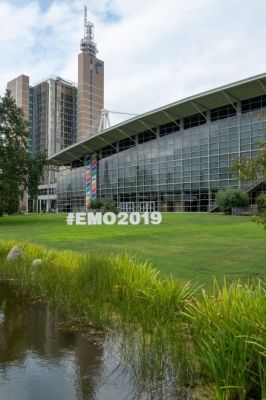EMO Hannover 2019: First Look
Andreas Scheuer, Federal Minister of Transport and Digital Infrastructure, together with Lower Saxony's First Minister Stephan Weil, Member of the Board of Management of Deutsche Telekom Adel Al-Saleh, Cecimo President Dr. Roland Feichtl and EMO General Commissioner Carl Martin Welcker, opened EMO Hannover 2019, the world's leading trade fair. For six days, Hannover will once again become a Mecca for the international production technology industry. The theme of the event is "Smart technologies driving tomorrow's production!" and more than 2,200 exhibitors from 48 countries are set to present their innovations for industrial production.
"Digitalization and networking have been the subject of much discussion over the last few years, but they are now finally being implemented in the production processes," said Welcker at the opening press conference in Hannover. Factories are becoming smart, machines and tools are becoming intelligent. They communicate with each other and are raising production to new quality levels. Many exhibitors are showcasing offerings for this. There are over 2,000 hits for the term "Industry 4.0" on the EMO website alone.
EMO Hannover presenting solutions to mega issues
Welcker sees major challenges and opportunities arising from the transition of the automotive industry – the sector's largest customer. "Electrification will not happen overnight. Rather, there will still be many optimized fossil fuel-powered vehicles on the road, either with pure combustion engines or hybrid drives," he said. The introduction of new drive technologies will undoubtedly lead to changes in individual manufacturing processes. However, the EMO General Commissioner strongly believes that highly differentiated solutions must be found to meet the highly disparate needs of cars, commercial vehicles, motorcycles, aircraft, marine engines, mobile machines and e-bikes. If we are to achieve the ambitious CO2 climate targets, it is all the more important to redouble our efforts in the search for future drive technologies, and to ensure that the best solution prevails in each case.
Researchers at FEV Consulting have calculated that fully electric vehicles will have a 19 percent share of the global market by 2030. This relates to 118 million new registrations, the overall number of which is not expected to change significantly from the 2017 figure. They also speak of a 64 percent reduction of the added value in the manufacturing process for pure electric drives, and 24 percent higher added value for plug-in hybrids.
In this scenario, any losses in production can potentially be compensated by new requirements. Improvements to the efficiency of the remaining combustion engines and transmission systems in the form of optimized surfaces, the reduction of noise emissions, protection against component wear (which is more intense in hybrids due to the switch from electric to combustion mode at high speeds) and the redesign of braking systems (required due to the high battery weights): all these factors call for new or modified production processes. In addition, there is the installation of rapid charging facilities nationwide. Complex new production systems are also needed for the manufacture of key electrical components such as batteries, traction motors and power electronics.





